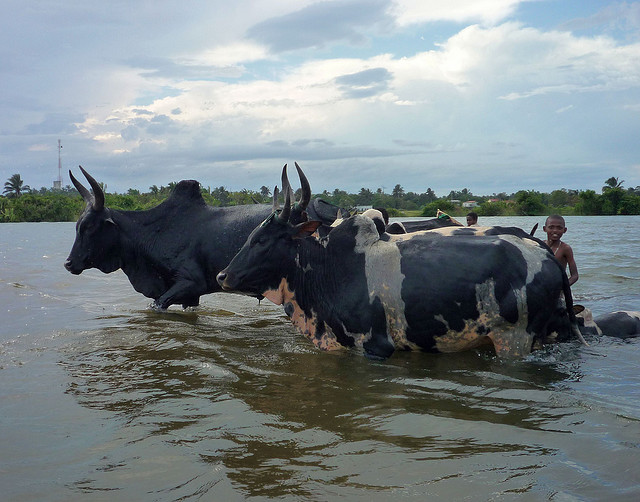The research claims to have isolated two genes critical in the development of disease-resistant cattle.
Harry Noyes, lead author of a paper on this published in the Proceedings of the National Academy of Sciences of the USA (PNAS) on 16 May, told IRIN their research had been prompted by the fact that while East African humped cattle breeds are susceptible to trypanosome parasites which cause sleeping sickness, the N’Dama, a humpless West African breed, is not seriously affected by the disease.
African animal trypanosomosis - also known as `nagana’ (Zulu: "to be depressed") or tryps - is transmitted through the bite of an infected species of the tsetse fly and is endemic from Senegal to Tanzania, and Chad to Zimbabwe (an area almost the size of the USA).
“The humped cattle [zebu] originated in India, where the tsetse fly is not found, while N’Dama, which probably had been exposed to [the] trypanosome parasite for thousands of years had developed a mechanism to control the impact of the disease,” explained Noyes, a senior researcher at Liverpool University.
Over the past two decades the researchers found at least 10 genes which control the impact of the disease in the N’ Dama breed.
Now that the scientists know what they are looking for, they have embarked on the task of isolating humped cattle breeds which also carry the two genes.
Over the next three years, ILRI intends to breed humped cattle varieties with at least one of the genes. The humped cattle breeds produce more milk than the N’Dama.
Decades away?
“This, of course, does not mean that poor farmers will soon have cattle that are resistant to sleeping sickness,” said Kemp. ILRI scientists will only be able to test resistance in the humped cattle after three years.
Thereafter it will take decades before sleeping sickness resistant breeds find their way down the chain to small farmers, the researchers believe.
“We can make the sperm and semen available for dissemination,” said Noyes, adding, however, that it was up to governments and extension services to make it accessible to all farmers.
Developing a resistant breed is critical as most of the drugs claiming to offer immunity to the disease are proving ineffective as new and drug-resistant strains of the disease evolve, according to the researchers. Furthermore, many of the new drugs are unaffordable for poor farmers.
In the week the discovery was published, the Global Alliance for Livestock Veterinary Medicines (GALVmed), announced a five-year plan to help livestock keepers in Africa access better drugs, diagnostics and maybe even a vaccine to deal with the disease.
Initially, the programme will identify ongoing research which could help livestock farmers.
At least three million cattle die from the disease in Africa every year, according to GALVmed. An estimated 50 million cattle and 70 million sheep and goats are at risk of tryps every year. Although best known for causing human sleeping sickness, the trypanosome parasite’s most devastating blow to human welfare comes when farmers have sick, unproductive cattle, said PNAS in a press release.
jk/cb
This article was produced by IRIN News while it was part of the United Nations Office for the Coordination of Humanitarian Affairs. Please send queries on copyright or liability to the UN. For more information: https://shop.un.org/rights-permissions





